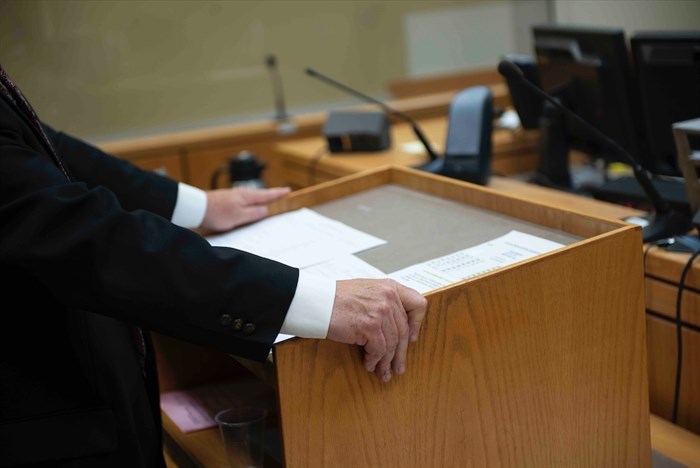
Image Credit: Cliff MacArthur/provincialcourt.bc.ca
April 03, 2022 - 11:00 AM
If you think there are fewer people in the Thompson-Okanagan being charged with crimes, even though crime rates continue to climb post-COVID, then you’re right.
Over the past five years, the percentage of charges sent to the B.C. Prosecution Service from police forces that were approved to go to court dropped from 87% in 2016/17 to 77% last year.
There was a gradual drop of 1% per year until 2019/20 when it sat at 84% before dropping to 77% in 2020/21.
READ MORE: Crime inched up in Kamloops last year
In order to recommend charges, the Prosecution Service has two key standards to meet: whether there is a substantial likelihood of conviction and, if so, whether the public interest requires a prosecution.
“This test has not changed in substance in the last 20 years,” Dan McLaughlin, communications counsel for the service, said in an email to iNFOnews.ca. “However, the B.C. Prosecution Service has fairly recently introduced amendments to this policy and introduced new policies on bail and probation that may have impacted the number of offences approved to court.”
Those changes were announced in April 2019 and “were aimed at reducing the overrepresentation of Indigenous persons in the criminal justice system,” he wrote.
In the Prosecution Service’s 2020/21 annual report, it shows there were 70,388 files submitted in 2018/19. That rose to 72,440 in 2020/21 then dropped in 2020/21 to 62,187 at the height of COVID.
Of those 62,187 files from last year, 47,125 were approved to go to court. If the approval rate had stayed at 87%, about 7,000 more charges would have been laid.
“The continuing consequences of colonialism for Indigenous persons in Canada provide the necessary context for any charge assessment involving an Indigenous person as a victim or potential accused,” the Crown Counsel Policy Manual states. “These consequences ‘must be remedied by accounting for the unique systemic and background factors affecting Indigenous peoples, as well as their fundamentally different cultural values and world views.’”
At an early stage in the charge assessment process, Crown Counsel are instructed to try to find out if it involves an Indigenous person and, if so, flag that on the file.
“Where Crown Counsel determines after charge approval that an accused identifies as an Indigenous person, they should consider this information and decide whether the public interest continues to require a prosecution,” it states.
READ MORE: Threats and assaults up significantly in Kelowna in 2021
McLaughlin, in his email, says it’s too early to say if the lower charge rate is due entirely to the policy change.
“More information will be required over a greater time period before any conclusions can be drawn from these results,” he wrote. “The next annual report may give us a better idea of whether this is a trend associated with the policies or whether it simply reflects the unique circumstances associated with the pandemic.”
To contact a reporter for this story, email Rob Munro or call 250-808-0143 or email the editor. You can also submit photos, videos or news tips to the newsroom and be entered to win a monthly prize draw.
We welcome your comments and opinions on our stories but play nice. We won't censor or delete comments unless they contain off-topic statements or links, unnecessary vulgarity, false facts, spam or obviously fake profiles. If you have any concerns about what you see in comments, email the editor in the link above.
News from © iNFOnews, 2022